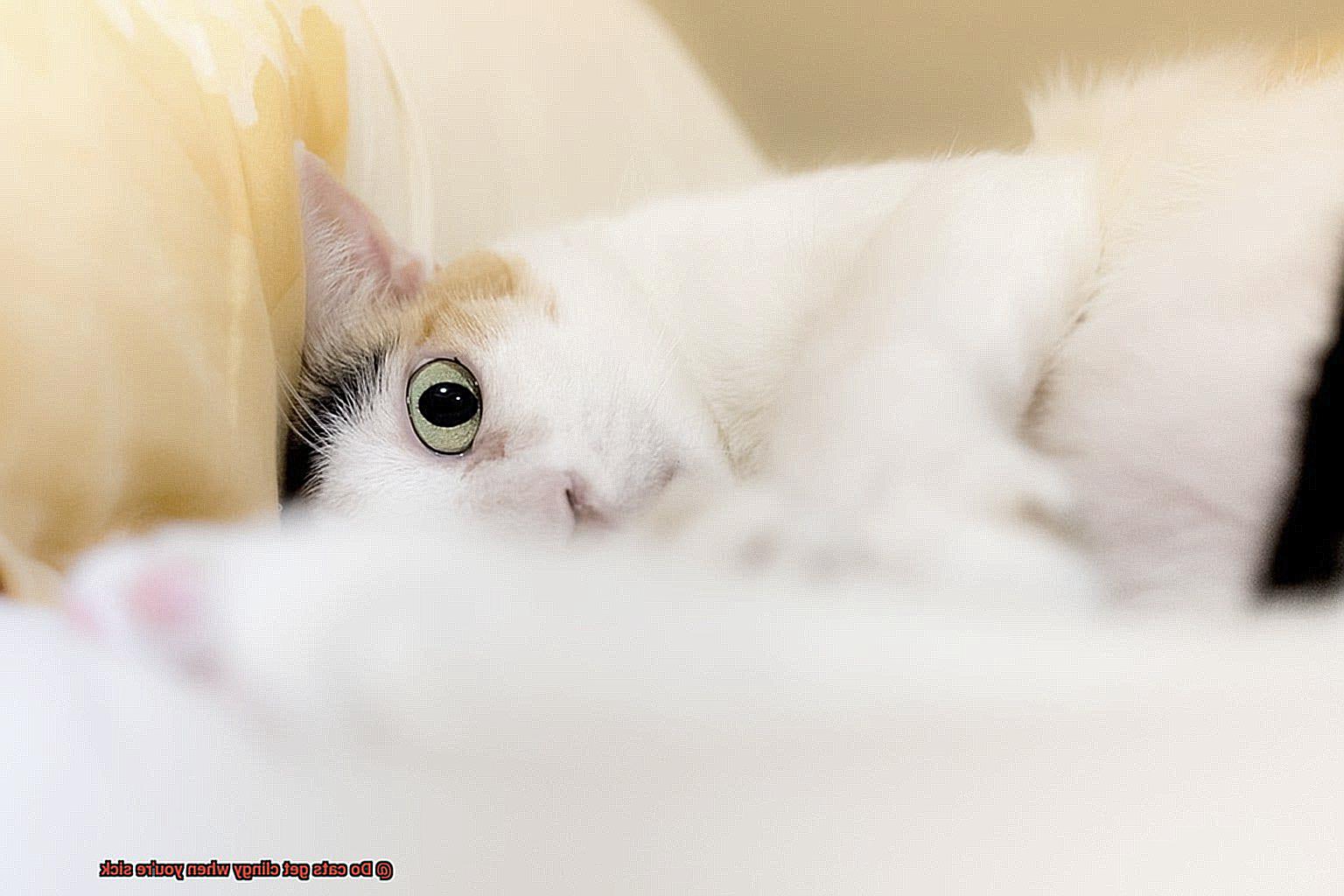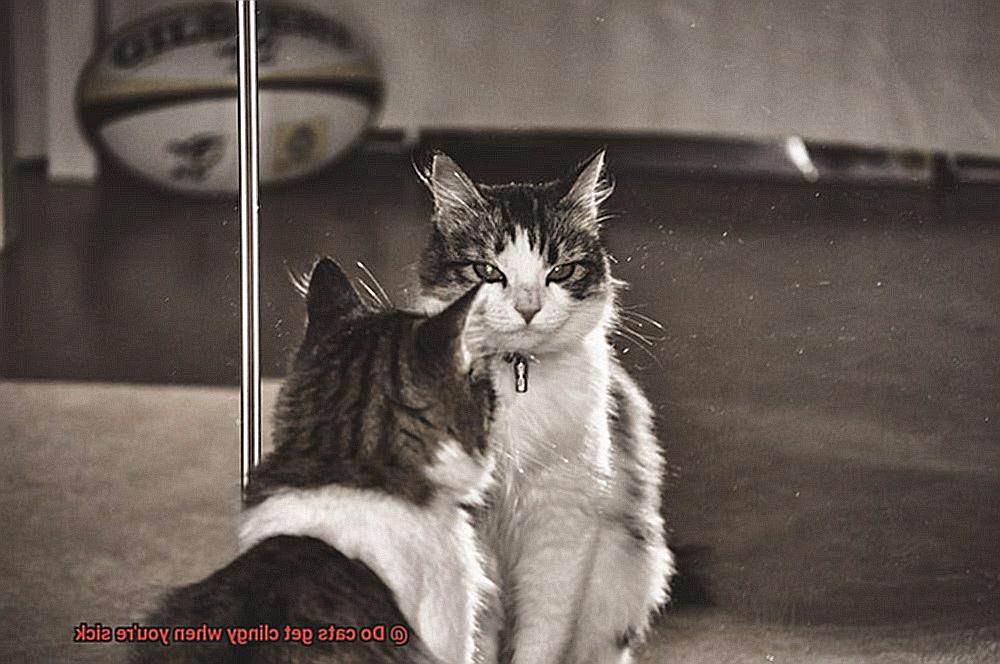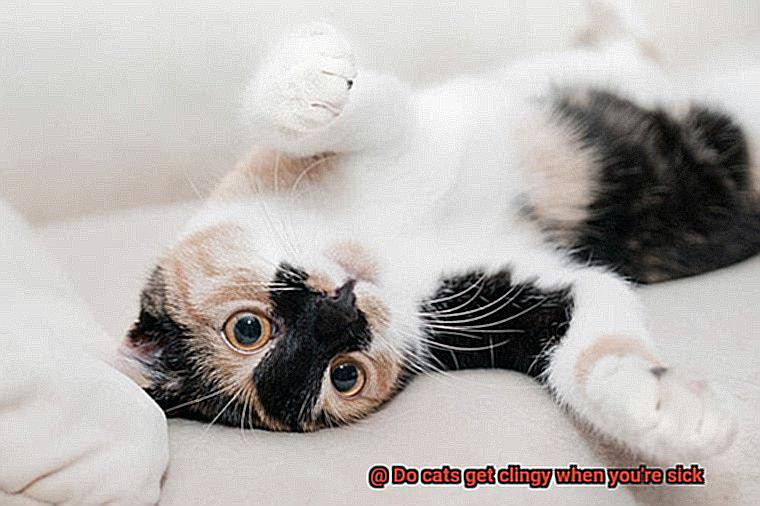There’s nothing quite like the feeling of having your furry companion snuggled up next to you when you’re feeling under the weather. Whether it’s a nasty cold or something more serious, pets have an uncanny ability to provide comfort and companionship during times of sickness. But have you ever noticed that your cat seems to become extra clingy when you’re not feeling well? Well, you’re not imagining things. It turns out that cats really do get clingy when their humans are sick.
As a devoted cat owner, you may be curious about what motivates this behavior. Is it just a coincidence, or is there something deeper at play? In this post, we’ll dive into the question “Do cats get clingy when you’re sick?” and explore the reasons behind why your feline friend might be sticking closer than usual. We’ll examine the tell-tale signs of clinginess in cats – from increased affection to following you around like a shadow – and discuss some possible explanations for this behavior.
Perhaps your kitty simply wants to provide comfort during your time of need, or maybe they have a heightened sense of empathy that allows them to pick up on your illness. Whatever the reason may be, understanding why cats get clingy when their humans are sick can help deepen our bond with these amazing creatures and improve our overall pet care.
So whether you’re a seasoned cat enthusiast or considering adopting a new feline friend, join us as we unravel the mysteries behind our furry companions’ behavior during times of sickness – and learn how to make the most out of these precious moments together.
What is Clingy Behavior?
Clingy behavior in cats is characterized by excessive attention-seeking and a desire to be in close proximity to their owner or caregiver. This can manifest itself in various ways, such as following their owner around the house, meowing excessively, or cuddling up on their owner’s lap. Though cats are known for their independent nature, they can also be very social and affectionate.
When a cat senses that their owner may be in distress or feeling unwell, they may become more clingy than usual. This behavior can be seen as the cat’s way of showing concern and providing comfort to their owner. It’s their way of saying “I’m here for you.”
However, it’s important to note that clingy behavior in cats can also be a sign of underlying health issues. If your cat’s clingy behavior persists or becomes more pronounced over time, it may be worth consulting with a veterinarian to rule out any underlying medical conditions.
So, if you notice your cat becoming more clingy than usual when you’re sick, don’t be surprised – it’s a common behavior for feline companions. Just remember to pay attention to any changes in your cat’s behavior and provide them with the care and attention they require.
Do Cats Get Clingy When You’re Sick?
While cats are known for being independent creatures, they can also be incredibly perceptive and empathetic animals.
When a person is sick, their body chemistry changes, and this change in scent may be picked up by their feline companion, who has a keen sense of smell. Additionally, a person who is feeling unwell may behave differently than usual – such as spending more time resting in bed or on the couch. Cats are observant creatures and may pick up on these changes in behavior.
However, cats’ desire to offer comfort and support to their owners cannot be overlooked. Despite having an independent reputation, cats have a softer side and can be incredibly loving and caring animals. When they sense that something is wrong with their owner, they may want to offer comfort and support in the form of snuggles or cuddles.
It’s important to note that not all cats will become clingy when their owners are sick. Every cat is unique and will react differently to illness or distress. Some cats may show affection in different ways, such as bringing their owner gifts like toys or treats.
If you do find that your cat is suddenly more affectionate when you’re not feeling well, it’s likely that they are trying to provide comfort and support during a difficult time.
However, if you notice any sudden changes in your cat’s behavior, it’s always a good idea to keep an eye on them to ensure that there aren’t any underlying health issues that need to be addressed.
Why Do Cats Become Clingy When You’re Sick?
There are a few reasons behind this unexpected behavior.
Cats have the remarkable ability to pick up on subtle changes in their owner’s emotional and physical state. When their owner is unwell or feeling under the weather, cats can sense the difference in behavior or scent that indicates something is not right.
As a result, they try to provide comfort and support by increasing physical contact and attention. It’s as if they know you need a little extra love and care during this time.
Besides, cats are creatures of habit and love routine. Any disturbance in their schedule can cause anxiety or stress. When their owner falls sick, their usual routine gets disrupted, making them feel uneasy and insecure.
To cope with this change, they seek comfort and stability through increased physical contact and attention.
Lastly, cats may become clingy when their owner is sick simply because they enjoy the extra attention and affection. As social animals, cats love being close to their owners and receiving physical affection. When their owner falls sick and spends more time at home, they take advantage of the opportunity to snuggle up and soak up all the love.
How to Comfort Your Cat When You’re Sick
To help support your furry friend during this time, here are five tips on how to comfort your cat when you’re sick:
Keep your cat close
When you’re feeling unwell, spending time in bed is common. Make sure your cat has a comfortable spot nearby so they can cuddle up with you. This will not only provide them with comfort but also help you feel better too.
Provide plenty of food and water
It’s important to ensure that your cat has access to fresh food and water at all times. If you’re unable to refill their bowls yourself, ask a friend or family member for help or consider using automatic feeders.

Give them extra attention
When you’re feeling ill, it can be challenging to give your cat the attention they deserve. However, if you can make an effort to play with them or give them some extra cuddles, it will help distract them from their owner’s discomfort and keep them entertained.
Keep them entertained
Just like humans, cats can become bored quickly. Make sure your cat has plenty of toys and activities to keep them occupied while you rest. This will help prevent them from becoming restless or stressed.
Monitor their behavior

Keep an eye on your cat’s behavior when you’re not feeling well. If they seem anxious or stressed, it may be a sign that they need some extra attention or care from you.

By following these tips, you can help comfort your cat while you’re sick and maintain a strong bond with them.
Other Ways Your Cat May React to Your Illness

This is especially true when you’re feeling under the weather. While some cats may become more affectionate and clingy, others may exhibit completely different behaviors. In this blog post, we’ll explore the various ways your cat may react to your illness.

Avoidance
It’s not uncommon for cats to distance themselves from their sick owners. They may sense that something is wrong and choose to stay away. This behavior could be due to a fear of contracting the illness or a sense of unease around the changes in your behavior.
Don’t worry, this doesn’t mean that your cat doesn’t care about you – they may just need some space.
Increased Vocalization
On the other hand, your cat may become more talkative than usual. They may meow more frequently or even cry out as a way to express their concern for you. This behavior could also be a sign that they are seeking attention and affection during this time. It’s their way of letting you know that they’re there for you.
Protective Behavior
Some cats may become more protective of their sick owners. They may follow you around the house, keeping an eye on you, and even try to keep other pets or people away from you. This behavior shows how much they care about you and want to keep you safe.
Anxiety and Stress
On the other hand, some cats may become more anxious or stressed when their owners are not feeling well. This can manifest in behaviors such as excessive grooming, hiding, or avoiding contact with their owner. If this is the case, it’s important to provide them with plenty of reassurance and love to help ease their anxiety.
No Noticeable Changes
Finally, some cats may continue with their normal routine and behavior patterns when their owner is sick.
This does not necessarily mean that they are not concerned or aware of what’s happening – cats are known for their independence and may prefer to observe from a distance rather than directly intervening.
FvFUZD0-Bco” >
Conclusion
In summary, it’s safe to say that cats do indeed become clingy when their humans are feeling under the weather. Clingy behavior can take on many forms, such as following you around, meowing more than usual or snuggling up close to you.
Cats have an uncanny ability to pick up on even the slightest changes in their owner’s physical and emotional state. They rely heavily on scent to navigate the world around them, so when your body chemistry changes due to illness, they’ll certainly take notice.
Despite their reputation for being aloof and independent creatures, cats can be incredibly loving and nurturing towards their owners. When they sense that something is wrong with you, they may feel compelled to offer comfort and support in any way they can.
If your cat is exhibiting clingy behavior while you’re unwell, it’s important to reciprocate their affection by providing them with plenty of food and water, a comfortable spot nearby for them to rest and some extra attention through playtime or cuddles. Be sure to keep an eye on their behavior as well – sudden changes could indicate underlying health issues that require attention.
In conclusion, cats are fascinating animals with unique personalities and behaviors. When you’re feeling sick, pay close attention to your feline friend’s behavior – chances are they’re trying to offer you some much-needed comfort and support during a tough time.







